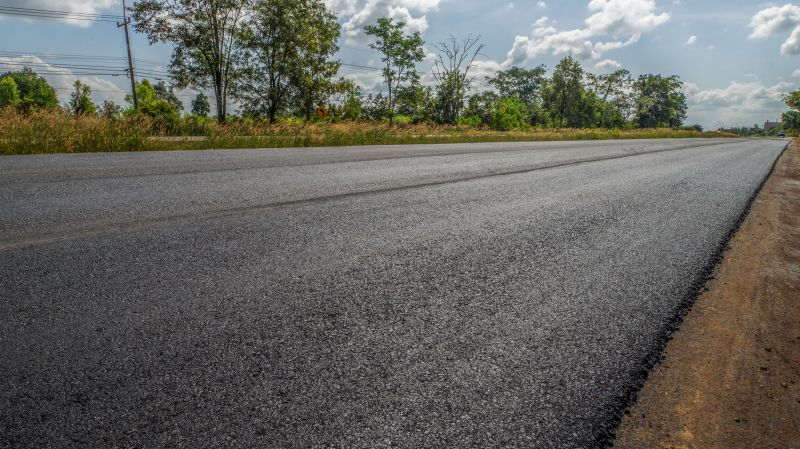Ultimate Asphalt Sealings Products To Maintain Your Pavement's Integrity
Select from high-performance asphalt sealing solutions designed to preserve and enhance your pavement's structural integrity.
 In Elkhart, Indiana, maintaining asphalt surfaces is essential for both residential and commercial properties. Proper asphalt sealing helps protect against the damaging effects of water, UV rays, and daily wear and tear, extending the lifespan of driveways, parking lots, and pathways. Selecting the right products for asphalt sealing involves understanding the variety of options available, each tailored to specific needs and conditions. From liquid sealers to patching compounds, there are numerous formulations designed to enhance durability and appearance.
In Elkhart, Indiana, maintaining asphalt surfaces is essential for both residential and commercial properties. Proper asphalt sealing helps protect against the damaging effects of water, UV rays, and daily wear and tear, extending the lifespan of driveways, parking lots, and pathways. Selecting the right products for asphalt sealing involves understanding the variety of options available, each tailored to specific needs and conditions. From liquid sealers to patching compounds, there are numerous formulations designed to enhance durability and appearance.
Top Overall Option
Premium Asphalt Sealer
A versatile asphalt sealer designed for ease of application and durable protection, suitable for various surfaces and climates. It offers a smooth finish and effective water resistance, making it a popular choice for both DIY enthusiasts and professionals.
Types of Products For Asphalt Sealings
Liquid Asphalt Sealers
Fluid coatings that form a protective layer over asphalt surfaces, easy to apply with brushes, rollers, or sprayers.
Asphalt Emulsion Sealers
Water-based sealers that provide a flexible and protective coating, suitable for various weather conditions.
Polymer-Modified Sealers
Enhanced formulas that incorporate polymers for increased adhesion, flexibility, and durability.
Coal Tar Sealers
Traditional sealers known for their strong water resistance, often used in commercial parking lots.
Fast-Drying Sealers
Formulations designed to cure quickly, minimizing downtime between application and use.
Cold Pour Crack Fillers
Pre-mixed compounds used to fill and seal cracks before applying a surface sealer.
Hot Pour Crack Sealants
Heated materials that effectively seal larger cracks and prevent water infiltration.
Patch Repair Compounds
Products used to repair potholes and surface damage prior to sealing.
Driveway Sealers
Specialized formulations optimized for residential driveways, balancing ease of application and protection.
Parking Lot Sealers
Durable coatings designed for large-scale commercial parking areas.
Silicone-Based Sealers
Flexible sealers offering excellent water resistance and UV protection.
Acrylic Sealers
Clear or pigmented coatings that enhance appearance while providing a protective barrier.
Polyurethane Sealers
High-performance sealers with excellent abrasion resistance and flexibility.
SBR (Styrene-Butadiene Rubber) Sealers
Economical options that offer good adhesion and weather resistance.
Eco-Friendly Sealers
Low-VOC formulations designed for minimal environmental impact while still providing effective sealing.
Heavy Duty Sealers
Industrial-grade products suitable for high-traffic areas.
Rejuvenators
Products that restore the flexibility and appearance of aged asphalt surfaces.
Popular Choices
Widely used for their ease of application and reliable coverage.
Commonly selected for their affordability and flexibility.
Preferred for enhanced durability and adhesion.
Popular in commercial settings for their water resistance.
Favored for projects requiring quick turnaround.
Essential for preparing surfaces before sealing.
A common choice for residential applications.
Often used in large-scale commercial sealing projects.
Selected for their flexibility and UV resistance.
Popular for enhancing appearance and protection.
Known for high performance in demanding environments.
Chosen for restoring aged asphalt surfaces.
When considering asphalt sealing products, factors such as ease of application, drying time, and compatibility with existing surfaces are important. Some products are formulated for DIY projects, offering straightforward application methods, while others are better suited for professional use. Additionally, the climate of Elkhart, IN, with its seasonal temperature fluctuations, necessitates choosing products that can withstand such variations without cracking or peeling.
Proper preparation is crucial before applying any sealing product. Cleaning the surface thoroughly to remove debris, oil, and existing cracks helps ensure optimal adhesion and performance. Applying the right amount of sealer in suitable weather conditions can significantly influence the longevity of the seal. Regular maintenance and timely resealing can prevent costly repairs and keep asphalt surfaces looking their best.
In the marketplace, there is a broad spectrum of asphalt sealing products, from basic asphalt emulsion coatings to advanced polymer-enhanced formulas. Understanding the differences and selecting the appropriate product type can make a substantial difference in the outcome of your sealing project. Whether for a small residential driveway or a large commercial lot, choosing the right product is key to achieving effective and lasting results.
Key Buying Considerations
- Surface Compatibility: Ensure the product is suitable for your specific asphalt surface and condition.
- Application Method: Choose a product that matches your preferred application method, such as spray, brush, or roller.
- Drying and Curing Time: Consider how long the product takes to dry and cure before the surface can be used.
- Weather Conditions: Select products formulated to perform well under your local climate and seasonal changes.
- Durability and Flexibility: Look for products that can withstand traffic and temperature fluctuations without cracking.
- Water Resistance: Effective sealing should resist water penetration to prevent damage from moisture.
- Ease of Use: Consider whether the product is designed for DIY application or professional use.
- Surface Preparation: Ensure proper cleaning and crack repair prior to sealing for optimal results.
- Environmental Factors: Avoid products with harmful fumes or VOCs if indoor or enclosed areas are involved.
- Cost and Coverage: Evaluate the coverage area per unit and overall project budget.
- Maintenance Needs: Some products require resealing at regular intervals; consider long-term maintenance.
- Environmental Impact: While not eco-friendly focus, consider products with minimal harmful emissions if applicable.
- Brand Reputation and Reviews: Seek feedback from other users for insights on performance and ease of application.
- Sealer Finish: Decide between matte, semi-gloss, or gloss finishes based on aesthetic preferences.
- Compatibility with Existing Sealers: Check if new products can be applied over previous sealers if needed.
